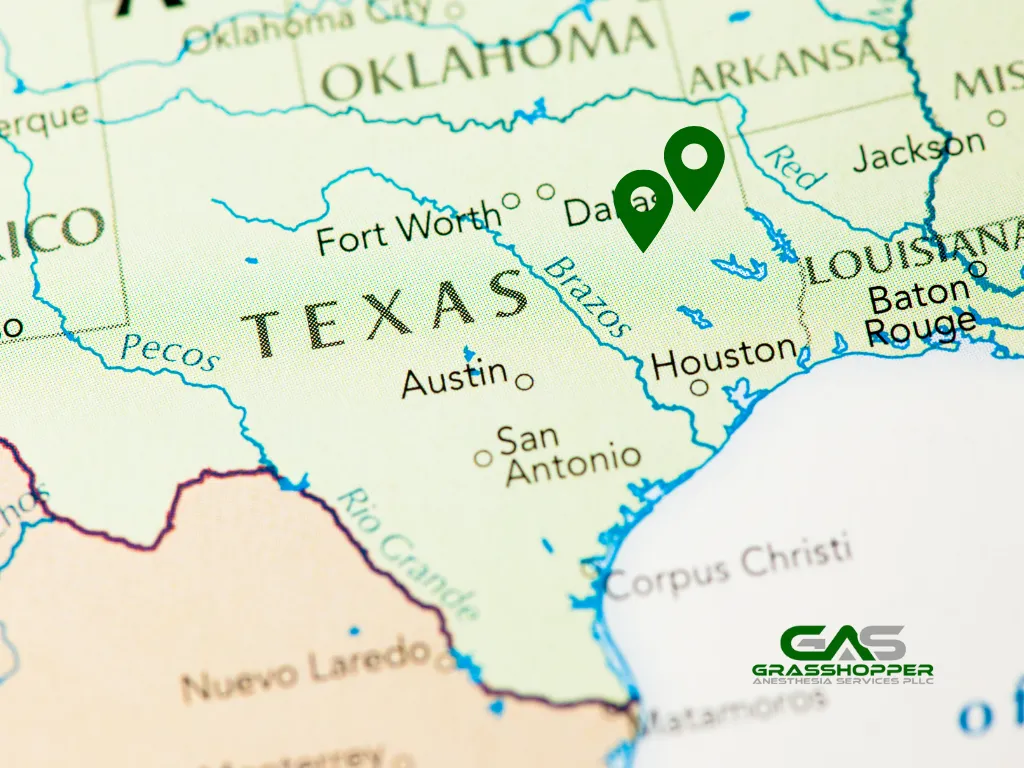by admin
Share
by admin
Share

As spring rolls in with its beautiful foliage and blooming flowers, millions of allergy sufferers find themselves battling the sniffles, sneezes, and itchy eyes of seasonal allergies. But if you have a medical procedure coming up, those allergies can do more than just make you uncomfortable — they can actually complicate how your body responds to anesthesia and impact your recovery. Understanding the connection between seasonal allergies and anesthesia is key to planning a safe and successful procedure.
What You Should Know About Anesthesia and Allergy Season
Allergies are an annoyance under normal circumstances, but they can actually pose potential problems when it comes to airway management and administering anesthesia. And, because of increased inflammation, allergies can create longer recovery times in certain patients. Here are the most common ways that seasonal allergies affect anesthesia patients.
Congestion Can Interfere with Airway Management
One of the biggest concerns for anesthesiologists during allergy season is congestion. A stuffy nose or inflamed airways can make it harder to breathe during sedation, particularly with general anesthesia. If your nasal passages are blocked or your throat is irritated from post-nasal drip, it may be more difficult to insert a breathing tube or ensure clear airflow during the procedure. This can increase the risk of complications and may require additional precautions from your anesthesia provider.
Respiratory Issues May Impact Sedation Levels
Seasonal allergies can sometimes trigger more than mild congestion. For individuals with asthma or reactive airway disease, allergies can bring on wheezing, coughing, or even shortness of breath. These respiratory symptoms can make it harder to safely administer anesthesia and maintain appropriate oxygen levels throughout your procedure. Sedation or the type of anesthesia may need to be adjusted, and extra monitoring may be necessary to prevent airway irritation or spasms.
Allergy Medications May Interact with Anesthetic Drugs
If you’re taking over-the-counter or prescription allergy medications such as antihistamines, decongestants, or steroids, be sure to let your anesthesia provider know. Some medications can cause drowsiness or interact with anesthesia, potentially amplifying its effects. Others, like decongestants, can raise your blood pressure, which might complicate the procedure. Your anesthesia team needs this information to tailor your sedation plan and avoid unwanted side effects.
Inflammation Can Slow Recovery
Allergy-related inflammation doesn’t just affect your sinuses — it can also influence how your body heals after surgery. Inflammatory responses can lead to increased swelling or discomfort in the postoperative period, and if you’re already coughing and sneezing, that added strain can make recovery more uncomfortable. Patients may also be more prone to post-anesthesia nausea or breathing issues if their respiratory system is already compromised by allergies.
Tips for Scheduling a Procedure During Allergy Season
While allergies don’t always require rescheduling a procedure, timing your surgery or treatment thoughtfully can go a long way toward reducing risks and making your experience more comfortable.
- Know your allergy triggers. If you typically suffer during the spring pollen surge or the mold-heavy fall months, try to avoid scheduling elective procedures during peak allergy season.
- Get your allergies under control early. Work with your primary care provider or allergist to manage your symptoms well in advance. Using allergy medications or undergoing treatment like allergy shots can reduce inflammation and improve your breathing before your procedure.
- Communicate with your provider. Always let your anesthesiologist know if you’re experiencing allergy symptoms or taking medications. They may adjust your sedation plan, delay the procedure, or take additional steps to keep you safe.
- Choose an experienced team. Anesthesia providers who understand the nuances of allergy season can make informed decisions about your care and recovery plan.
Trust Grasshopper Anesthesia for Safe, Personalized Care
At Grasshopper Anesthesia, we understand that no two patients — or allergy seasons — are exactly alike. Our CRNAs are experienced in managing complex cases, including those complicated by respiratory issues or seasonal allergies. We take the time to review your symptoms, medications, and medical history to create a personalized anesthesia plan that puts your safety first. Whether it’s springtime sniffles or autumn congestion, we’re here to make sure your sedation and recovery go as smoothly as possible — no weekends, holidays, or on-call surprises. Breathe easy with Grasshopper Anesthesia, because your comfort and care is always in season.
While rural hospitals are the backbone of healthcare access for countless Americans, these facilities continue to face a persistent and complex challenge: maintaining reliable anesthesia coverage. From staffing shortages to fluctuating surgical volumes and even limited recruitment avenues, rural facilities struggle to deliver consistent, high-quality care. Gaps in anesthesia coverage lead to a host of
Finding the right balance between personal and professional life can be challenging, especially for anesthesia providers. In today’s fast-paced healthcare climate, the demand for reliable professionals is growing faster than ever. At Grasshopper Anesthesia Services, our goal is to bridge the gap between work and life. We are committed to providing flexible placement opportunities that
Access to quality healthcare can look very different depending on where you live. While urban areas often have large hospitals and specialized providers nearby, many rural communities struggle with limited resources and long travel times for care. Grasshopper Anesthesia CRNAs transform communities by bridging the divide between quality healthcare and rural areas from Gonzales to
Not all CRNA jobs are created equal. The right opportunity isn’t just about location or pay, it’s about aligning your skills, lifestyle, and career goals so you can thrive in the long run. Going above and beyond just filling positions, Grasshopper Anesthesia matches CRNAs with the roles that fit them best. Learn about our process




